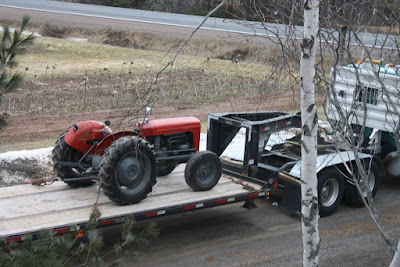As published in the Citizen-Record newspaper on Wednesday, March 16, 2016, by Sara Jewell.
When I arrive at the small cabin at the
edge of a 25-acre sugar woods outside Springhill, Nova Scotia, smoke is
billowing out of the chimney. Stepping inside, I breathe in the warm, sweet,
moist air and instantly crave a feed of pancakes.
Because syrup is boiling in the large,
stainless steel evaporator sitting in the middle of the small room.
Jack Simons greets me then grabs a homemade
tester (made from a soup can and a wire coat hanger) off the wall behind him. He
dips the tester into the small pan above the wood stove and brings it out
again, watching what happens as he drains the dark syrup back into the pan.
When the syrup sticks along the edge of the
can, it’s ready to be poured.
“I like to do it the old-fashioned way,”
Jack explains as he returns the homemade tester to its nail on the wall. The
modern way would involve a gauge in the pan that automatically detects the
perfect temperature.
Between tests, he takes me outside to show
me how a tree is tapped and explains the systems of lines that brings the sap
from all the trees down to one main line into the cabin where it ends up in a
75 gallon tub.
Since sap is mostly water, it takes 40
gallons of sap to make one gallon of syrup.
“That’s what takes the time, boiling the
water off,” says Jack who’d started boiling this batch of sap three hours
earlier. “But it’s better than the big pot over the bonfire.”
There is no television or radio in the cabin;
the only sounds are the hiss of water boiling, the snap of the wood fire, and the
drip of condensation into a large steel pot. Although Jack compares the waiting
like watching grass grow, it’s peaceful work, and genuinely productive.
Jack, who is 77, began making syrup for
family and friends in 2008 once he’d fully retired from the military, trucking,
and working in Noel Smith’s sugar woods. When his son, Justin, retires in a few
years, they plan to expand into a commercial maple syrup business.
This is an early year for tapping up; Jack
says their first pour was March 1st. Last year, after the heavy
snows, their first pour was March 29.
As the syrup thickens, we stay inside. This
is not a process you can rush, or neglect. The fire needs stoking, the
thermometer needs checking. With each dip, the syrup runs off the can a little
stickier.
“Almost,” we say at the same time, and
laugh. We say it four times until Jack, finally, declares, “That’s it.”
He opens the spigot and rich, sweet syrup
flows through a filter into the waiting jug. After that pour has been filtered into
a larger container, Jack hands me a steel mug with a measure of syrup in the
bottom.
“It’s so dark,” I say.
“That’s because we tap white and red
maples,” he explains.
I tip the mug back and into my mouth flows a
taste that defies description but I realize one important fact: Sweet, pure,
freshly-made maple syrup is best served warm.














